ICRI has been a long-term partner to the Secretariat of the Convention on Biological Diversity (CBD), and its formation was announced at the inaugural Conference of the Parties to the CBD, on 7th December 1994, by its eight founding countries. 2024 marks 30 years of championing coral reefs. At the occasion of the Sixteenth Conference of the Parties to the Convention on Biological Diversity (CBD COP16), Cali, Colombia, ICRI’s involvement was therefore essential in elevating coral reefs in the global biodiversity agenda.
Coral reefs were also a topic of discussion during the negotiations. The ICRI Secretariat welcomes the acknowledgment of coral reefs in the Programme of Work for the conservation and sustainable use of marine and coastal biodiversity which not only sets new priorities of action, calling on efforts to improve understanding on ocean acidification and warming to enhance resilience but also to:
- Recognise the deep concern for the increased frequency of mass coral hashtag#bleaching and the increasing risk of irreversible loss of coral reefs; and
- Urges Parties, other Governments and relevant organisations to hashtag#accelerate implementation of priority actions for coral reefs.
Learn more about ICRI at COP16 below:
Key Asks #ForCoral
The GBF provides a crucial roadmap for safeguarding the planet’s biodiversity. Coral reefs are not explicitly mentioned in the Framework’s 23 Targets, yet 16 out of 23 targets are considered to be highly relevant. Prior to COP16, the ICRI Secretariat released an information note highlighting the Key asks for coral reefs at CBD COP16 with a call for both coral reef and non-coral reef states to: strengthen management frameworks; ensure effective restoration; integrate effective pollution management and regulations; build capacity and share knowledge; establish robust monitoring systems; and scale finances from both public and private sectors.
These asks continue to be critical, and we encourage all ICRI members to champion these asks #ForCoral to 2030 and beyond.
The #ForCoral Pavilion
Throughout COP16, the #ForCoral Pavilion was a vibrant and dynamic space, hosting over 40 events. The turnout was remarkable, with many sessions so well attended that we often reached and exceeded the Pavilion’s capacity! Overall, we welcomed over 1,100 visitors, establishing the Pavilion as a true hub for collaboration and knowledge-sharing among participants from across the world. The strong engagement highlighted just how deeply stakeholders and communities value the urgent and coordinated action needed to protect coral ecosystems. From policy dialogues to community-driven solutions, the #ForCoral Pavilion fostered meaningful discussions, sparked new partnerships, and reinforced a shared commitment to coral reef conservation in line with the Global Biodiversity Framework. A full summary report will be released shortly.
All the photos and videos collected from the Pavilion are available here and please do not hesitate to share your photos with us to include!
Once again we would like to express our gratitude the Pavilion sponsors!
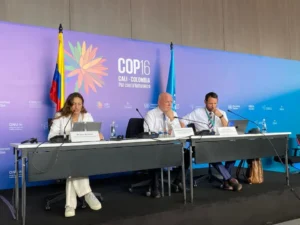
Press Conference #ForCoral
The ICRI Secretariat conducted a press conference alongside H.E. Ambassador Peter Thomson, UN Secretary’s Special Envoy for the Ocean and the Global Fund for Coral Reefs (GFCR) to detail the urgency of increased funding to ensure a future for coral reefs. The clear messaging of the urgent need for pace, financing and effective solutions was underlined by the conditions in the Caribbean with corals facing the risk of severe bleaching for the second year running as part of the record-setting Fourth Global Coral Bleaching Event (4GBE) where 77.2% of the world’s coral reefs have experience bleaching-level heat stress.
Emergency Special Session on Coral Reefs
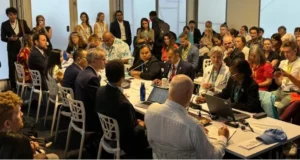 ICRI, the GFCR, and H.E. Ambassador Peter Thomson convened the COP16 Emergency Special Session on Coral Reefs. ICRI supported this critical gathering, which brought together representatives of coral states, key leaders in coral reef action, and globally renowned scientists. The objectives of the Special Session included sharing the latest scientific analyses on the unprecedented 4GBE, delivering clear action points, integrated strategies and scalable resilience initiatives. ICRI’s contributions emphasised the urgency of averting functional extinction through science-based, scalable conservation actions. Special thanks to White House Council on Environmental Quality Chair Brenda Mallory for attending the session and stating the need for more urgent coral reef discussions to ensure a future with healthy, vibrant reefs.
ICRI, the GFCR, and H.E. Ambassador Peter Thomson convened the COP16 Emergency Special Session on Coral Reefs. ICRI supported this critical gathering, which brought together representatives of coral states, key leaders in coral reef action, and globally renowned scientists. The objectives of the Special Session included sharing the latest scientific analyses on the unprecedented 4GBE, delivering clear action points, integrated strategies and scalable resilience initiatives. ICRI’s contributions emphasised the urgency of averting functional extinction through science-based, scalable conservation actions. Special thanks to White House Council on Environmental Quality Chair Brenda Mallory for attending the session and stating the need for more urgent coral reef discussions to ensure a future with healthy, vibrant reefs.
KMGBF Pavilion – Ocean Day
In the spirit of the Ocean Day theme, a wide range of entities co-organised various sessions which highlighted key linkages across ocean issues.
The ICRI Secretariat took part in the panel session focused on “Synergies and Partnerships for impact, Uniting for the Ocean: Accelerating Action for Biodiversity Goals”, where ICRI’s pivotal role in driving coordinated global action #ForCoral was emphasised. By uniting governments, NGOs, scientists, and local stakeholders, ICRI fosters collaborative solutions that address the complex threats to coral reefs, including climate change, pollution, and overfishing. Through these partnerships, ICRI ensures that scientific insights guide policy, aligning coral reef goals with global biodiversity frameworks such as the CBD. Additionally, ICRI’s connections with regional seas programme and international bodies amplify local actions into scalable, impactful solutions for coral reefs worldwide.
Informal Roundtable on NBSAP
On 25th October 2024, ICRI hosted an informal roundtable discussion for coral reef nations on how to integrate coral reefs into National Biodiversity Strategies and Action Plans (NBSAPs), which are the main vehicle for implementation of the GBF at the national level. The event underscored the importance of integrating coral reefs into NBSAPs, highlighting the need for urgent actions to safeguard coral ecosystems amid climate change and increasing anthropogenic pressures. ICRI stands ready to support Parties and Governments to integrate coral reefs into NBSAPs. We further thank the CBD Secretariat to attend the event amongst a busy schedule.
 Coral Reef M&E: Insights for Conservation Impacts
Coral Reef M&E: Insights for Conservation Impacts
The Caribbean Chapter of the Global Coral Reef Monitoring Network (GCRMN) hosted a session to explore how collaborative reef monitoring and effective reporting could drive conservation actions for greater impact, including an update on the Status and Trends of Coral Reefs in the Caribbean regional report. The ICRI Secretariat provided a presentation on the policy recommendations #ForCoral and further information on the Status of Coral Reefs of the World 2025.
 Advancing the Marine Conservation Breakthroughs
Advancing the Marine Conservation Breakthroughs
The event featured an “Implementation is Now” segment, followed by two panel discussions that brought together governments, finance, private sector, and expert practitioners to showcase concrete opportunities and initiative. To ensure effective action without overburdening nations, the ICRI Secretariat highlighted that the coral reef breakthrough, and all related initiatives, must align with the GBF and avoid a siloed approach.
 Film and Nature: A Deep Dive into Coral Reef Conservation
Film and Nature: A Deep Dive into Coral Reef Conservation
A unique platform to highlight the vital importance of coral reef ecosystems and foster a global-local dialogue on conservation strategies. Hosted by the British Embassy and CoralTheca, the event premiered the documentary “CoralTheca: Elvira’s Legacy to the Reefs of the Colombian Caribbean.” Following by a panel discussion of experts, including the ICRI Secretariat, that underscored the critical role of coral reefs for biodiversity, coastal resilience, and local communities.
 KMGBF Pavilion – Restoration Day
KMGBF Pavilion – Restoration Day
ICRI provided a voice #ForCoral during Restoration Day, as an official supporting Partner to the UN Decade on Ecosystems Restoration, and highlighted its successful partnership, which has united multiple stakeholders for coral restoration for three decades. Moreover, ICRI provided more information on the complexity of coral reef restoration, which can be costly and challenging to scale, emphasising that coral restoration requires continuous involvement of local and traditional communities.
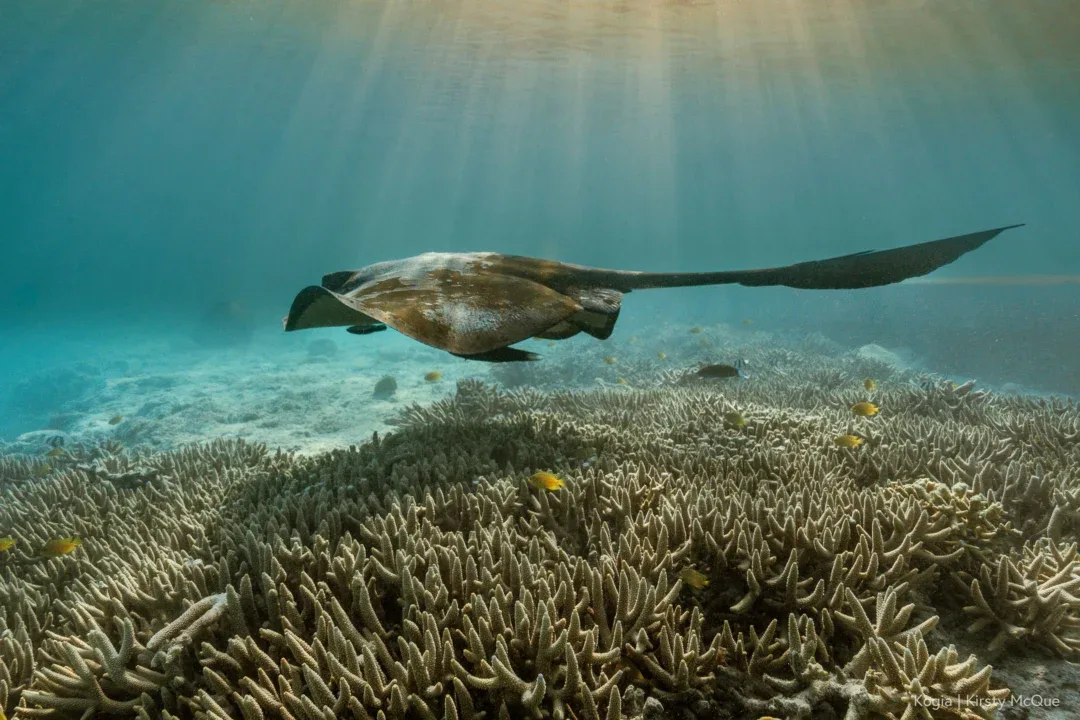

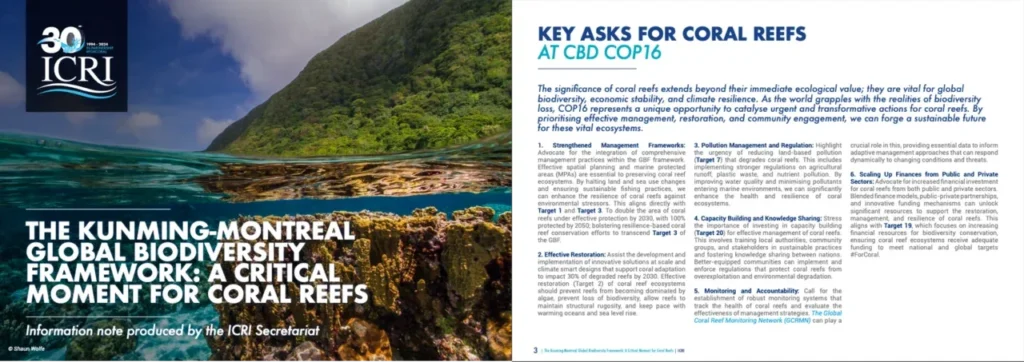
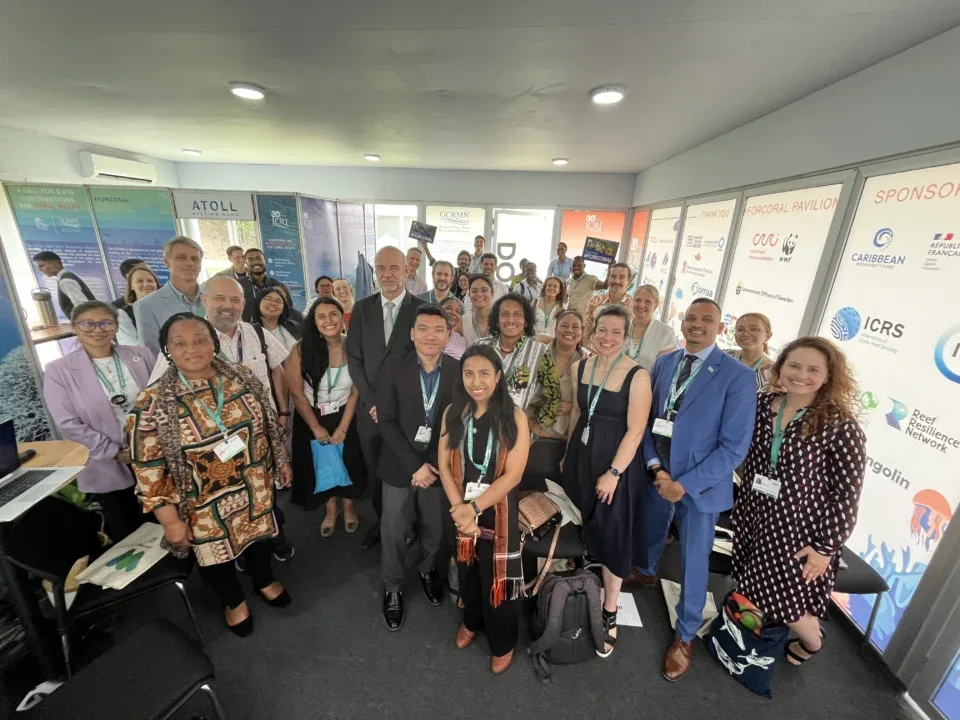
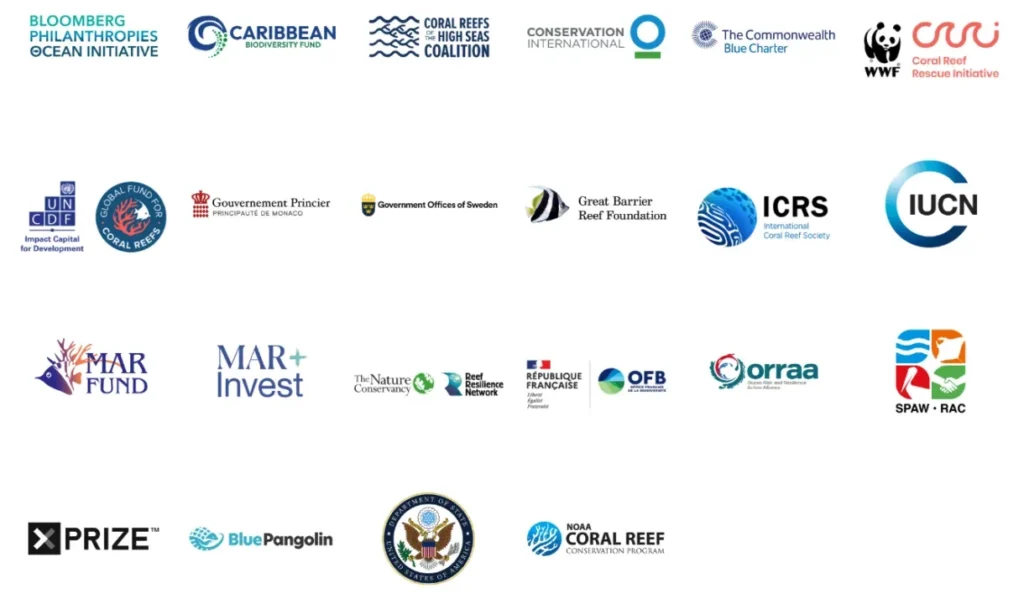
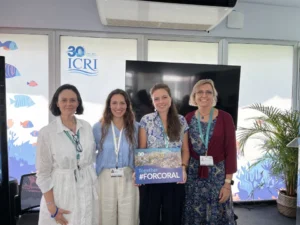 Coral Reef M&E: Insights for Conservation Impacts
Coral Reef M&E: Insights for Conservation Impacts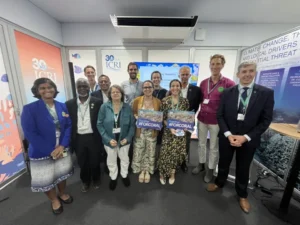 Advancing the Marine Conservation Breakthroughs
Advancing the Marine Conservation Breakthroughs Film and Nature: A Deep Dive into Coral Reef Conservation
Film and Nature: A Deep Dive into Coral Reef Conservation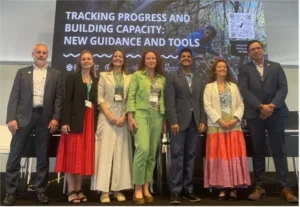 KMGBF Pavilion – Restoration Day
KMGBF Pavilion – Restoration Day